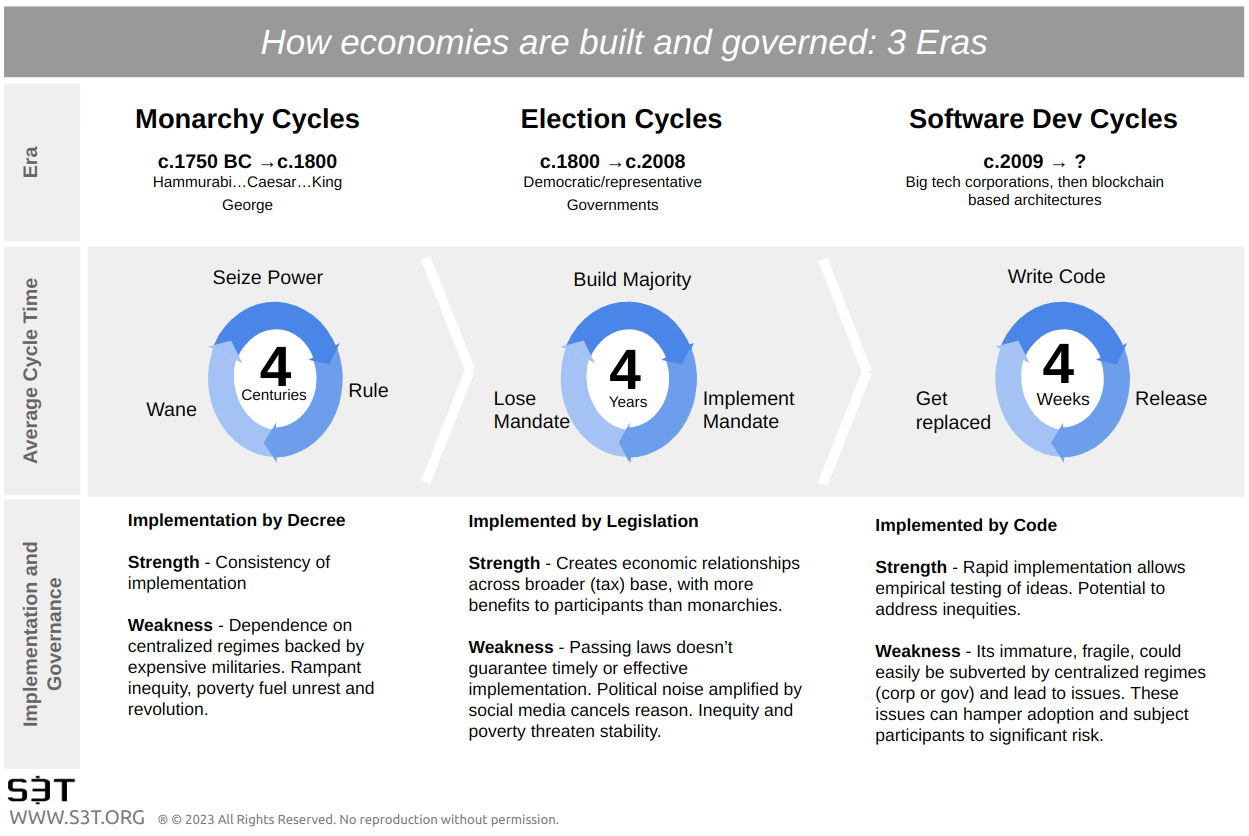❄️ S3T - Dec 1, 2023 - AI Power struggles, CPI, economic evolution, GenAI legal action, Tricking LLMs, Eth ETF, Holiday giving guide.

😎️ Happy Friday! Hope you are ready for a nice weekend! In this edition of S3T:
- Macroeconomics: Yes, inflation is slowing. No, the central banks do NOT deserve credit. Return to office is dead. The way economies are built is changing.
- Emerging Tech: OpenAI's power struggle. GenAI drives groupthink among professionals who use it. Researchers trick LLMs into revealing their training data.
- Nature Notes: The Hardiness Zones are changing. Where to read financial disclosures. Nature-friendly holiday shopping.
Macro: Signals for Change Leaders
This week the Fed signaled that it may be done with rate hikes but that rates may stay higher for longer. Overall economic momentum is slowing: while GDP was revised upward, consumer spending is down.
Yes, inflation is slowing. No, the central banks do NOT deserve credit
The specific inflation indicators that alarmed the Fed were always going to correct on their own and the Fed's rate hikes didn't help - they made things worse argues this set of economists. Why they're pointing this out now:
- The rate of inflation cooled to 3.2% in October (down from 9% in June 2022)
- This doesn't change anything for working families who are still paying way more for everything than they were in 2019 (see John's Hopkins Krieger School chart below). Most prices are not falling.

🍹️The cocktail that got us here
Drawing from several works not previously examined together, Roge Karma gives a panoramic history of America's economic misfortunes and the inflection points that drove them. Two excerpts:
- "No other advanced economy pivoted quite as sharply to free-market economics as the United States, and none experienced as sharp a reversal in income, mobility, and public-health trends as America did."
- "Of Americans born in 1940, 92 percent went on to earn more than their parents; among those born in 1980, just 50 percent did...Today, a child born in Norway or the United Kingdom has a far better chance of outearning their parents than one born in the U.S."
Karma shows how a cocktail of 3 toxic ingredients - racist reactions to civil rights, progressive elitism, and the 1970s inflation crisis - set up the dynamic of economic decisions and political agendas that led to the current financial instability.
Highly recommended for anyone who wants to understand the financial innovation opportunities we face today.
Economic evolution
In previous eras, economies were structured and governed by laws implemented imperfectly by governments and citizens. We seem to be headed for a new era where economies are being structured by code. See the graphic below:

RIP Return to Office
The data shows Return to Office is dead says this Standford researcher who also found that employees equate being forced back to the office with an 8% raise. Key points that got overlooked in the Return to Office fervor:
- Daily commutes remove a massive amount of valuable time from a worker's best hours
- When people meet in person, there can be a boost in communication, bonding and collaboration. But this positive boost doesn't persist day after day. We have decades of pre-pandemic data showing abysmal engagement and collaboration from people stuck in cubicle land.
- In the US, mental health among workers is improving due to greater work-life balance associated with remote work options. See also this Cisco study (PDF), and the Future Forum survey (PDF).
Related: 3 reasons why some companies tried to force employees back to work (not all of them good).
Emerging Tech
What is surfacing from the OpenAI power struggle
Sam Altman's sudden firing from OpenAI and subsequent return has a couple of layers. On its face, it shows the dangers of the right hand not talking to the left: in this case the product/profit-driven stakeholders and the research/non-profit stakeholders were apparently locked a power struggle complicated by festering mistrust and an alleged secret project "Q". OpenAI had a unique board structure intended to reflect its goal of beneficial AI.
The layer underneath is what's interesting. This is a microcosm of the economic power struggle that plays out every time technology advances.
When groundbreaking technologies emerge, they create power struggles:
- Nuclear weapons are the go-to historical example (with the power struggle of control vs proliferation still playing out).
- AI and digital currencies are the two current examples we are most aware of.
- Less obvious, but very real, is a power struggle within healthcare over data standards.
- Quantum computing - as it matures - may spawn another power struggle.

The Power Struggle
On one side, there are innovators and entrepreneurs, enthusiastic about the potential of these technologies. Their focus is on developing new products, gaining a competitive edge, and generating profits. They argue that if they don't advance and utilize these technologies swiftly, other competitors might take the lead.
On the other side are the cautious stakeholders. They prioritize deliberate change, safety, fairness, ethical considerations, and not infrequently self-interest. Their concern is that if these technologies are not handled responsibly, they could lead to harmful consequences or even existential risks. They advocate for a more measured approach, emphasizing the need for safety protocols and ethical guidelines.
Sam Altman's firing and rehiring mirrors the broader conversation about the responsible use of powerful, disruptive technologies. One group doesn't want to miss a crucial opportunity. The other doesn't want to allow harm. The messy reality: neither can truly succeed without the other.
Gen AI Lawsuits
Matthew Butterick is leading a legal crusade to ensure that creative works are not exploited by Big Tech AI training processes. At issue: Big Tech companies used creative works without permission to train their AI models. Those models now can be used to create similar creative works with no compensation to the original creators.
OpenAI has evaded questions about training data, but some researchers are finding ways to trick ChatGPT into revealing at least some of its training data (one extraction example here).
These AI firms are once again following a proven pattern:
- Find an asset that isn't protected
- Appropriate it then incorporate it into a product or service
- Wring out big profits
Historic perspective: Big Tech did this with personal data as they built their large platforms and billion-dollar business margins: they took advantage of the fact that the legal system had not yet evolved to protect the data and privacy of individuals. It's ethically similar to the historic appropriation of Indigenous lands and resources simply because they happen to not be under the protection of a recognized regime.
Also Notable: This BCG Harvard MIT study found that using Gen AI technology reduced a group's diversity of thought by 41%.
Ethereum ETFs
Fidelity has applied for SEC approval of an Ethereum Exchange Traded Fund. The filing pointedly noted that if spot ETFs had been available in the US, some of the fallout from the FTX scandal could have been avoided.

Nature Notes
Finally the Gardening Map is changing
Some plants will grow earlier and farther north thanks to climate change. The USDA manages a map of "plant hardiness zones" which gardeners use as a guide of what to plant when, and what will successfully grow in their specific zone. You may see these maps on the backs of seed packets.

The natural setting for financial success
This unassuming caretaker of a mobile home park left $3.8M to his small town after a quiet life of frugality and careful investing. My favorite quote from the piece: "Holt would find a quiet place to sit near a brook and study financial publications."
Nature-Friendly Gifts for the Holiday Season
- Jetty offers coastal styles and activewear made from oyster shells
- Adidas Parley offers shoes and sportswear made from recycled ocean plastic. Their origin story will inspire innovators and change leaders.
- Conscious Step offers shopping that supports specific causes. For example, shop for socks whose sales proceeds go to protect specific endangered species.
- Wolf and Badger - Online shop for the world's best independent ethical brands.
- Cornell's Bird Academy offers a rich array of online courses for every level of artist, photographer, bird watcher or nature lover.
For Paying Members
🏫 S3T Resource Library
Curated collections of insights, time-saving explainers and accelerators that frame key trends and issues with important context and perspectives. Some include worksheets or additional resources.
🛠 40 Best Online Tools & Resources
Top trusted online tools that save you time and $$$, as well as best online sources for emerging tech & research, economic insights, shifts, trends, history, culture and nature.
🌍 Global Economic Dashboard
500+ US & Intl real-time economic indicators organized by nation and release dates. Tap or click any indicator for detailed charts.
🪙 Crypto Market Caps
Top 100 Crypto Market Prices and Indicators. Colors indicate 24hr price movement, size of boxes indicate Market Cap.
Thank you again for reading and sharing S3T!


Member discussion